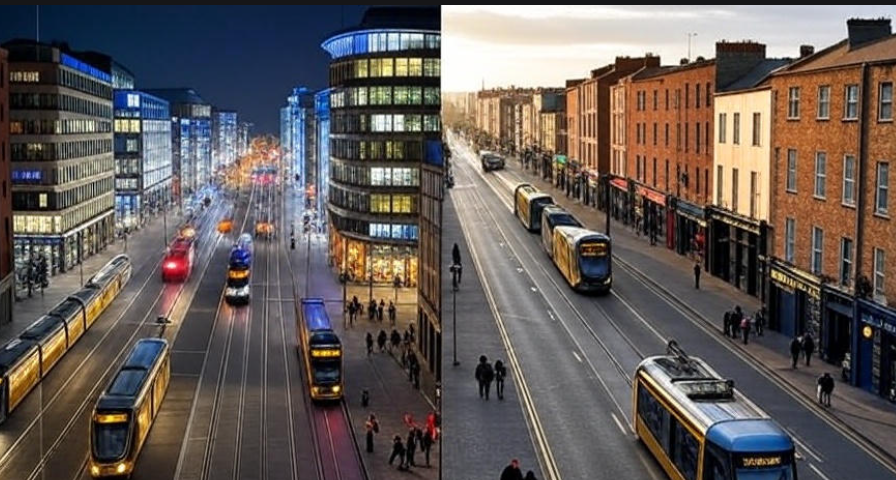Building a career in a new country can feel exciting, but it also comes with challenges that you might not have faced before. Ireland is one of the top destinations for professionals who want good opportunities, a friendly environment, and a high quality of life. If you’re a foreigner thinking about starting your career here, the process can be smoother if you know the right steps.
Why Ireland is Attractive for Foreign Workers
Ireland has a strong economy, and many global companies have their European headquarters here. Big names like Google, Facebook, Microsoft, Pfizer, and Apple have offices in Ireland. This means more jobs in IT, pharmaceuticals, finance, healthcare, and other growing industries. On top of that, English is the main language, which makes it easier for many foreigners to adapt.
Understanding Work Permits
To work in Ireland as a foreigner, you will usually need a work permit. The type of permit depends on your job.
Here’s a simple breakdown:
| Type of Permit | Who It’s For | Key Points |
|---|---|---|
| Critical Skills Employment Permit | High-demand jobs like IT, engineering, healthcare | Easier path to permanent residency |
| General Employment Permit | Jobs that are not on the shortage list | Needs a job offer first |
| Intra-Company Transfer Permit | For employees of multinational companies | Allows you to work in Ireland temporarily |
Having the right permit is the foundation of your career journey in Ireland.
Finding the Right Industry
Not all industries are the same in terms of demand. Some are growing faster and actively looking for foreign professionals.
Here are the top sectors:
-
Information Technology (software developers, data analysts, cybersecurity experts)
-
Healthcare (doctors, nurses, care assistants)
-
Finance and Banking (accountants, auditors, analysts)
-
Engineering (civil, mechanical, electrical engineers)
-
Hospitality (chefs, hotel managers, tourism staff)
If your skills fall into these sectors, you’ll have a better chance of finding work quickly.
Creating a CV That Fits Irish Standards
Your CV in Ireland should be short and clear. Employers prefer two pages maximum. Add your work experience, education, and skills. Avoid adding personal details like age, marital status, or photo unless asked. Write in simple English and keep it professional.
Example layout for an Irish-style CV:
| Section | What to Include |
|---|---|
| Contact Details | Name, email, phone, LinkedIn |
| Profile Summary | A short 3–4 line introduction about you |
| Work Experience | Jobs listed with dates and responsibilities |
| Education | Degrees, diplomas, or certificates |
| Skills | Technical and soft skills |
| References | “Available on request” is enough |
Networking is a Game Changer
Many jobs in Ireland are filled through networking before they even appear online. Attend career fairs, professional meet-ups, or join online groups like LinkedIn communities. Don’t be afraid to reach out to people who already work in your field. A friendly message or coffee chat can sometimes open more doors than just sending CVs.
Using Recruitment Agencies
Ireland has many recruitment agencies that specialize in helping foreigners find jobs. Agencies like CPL, Sigmar Recruitment, and Morgan McKinley are well-known. Register with them, share your CV, and let them connect you with employers.
Understanding Work Culture in Ireland
Every country has its own work culture. In Ireland, the workplace is usually friendly and team-oriented. People value punctuality, but they also like casual conversations. Irish professionals often balance seriousness with humor, so don’t be surprised if colleagues make light jokes during meetings. Being polite, cooperative, and respectful will help you fit in easily.
Improving Your Skills Before Moving
One of the smartest things you can do is upskill before moving to Ireland. For example:
-
Learn technical tools used in your industry (like Python, SQL, or SAP).
-
Take English communication courses if it’s not your first language.
-
Get certifications that are recognized internationally.
This way, when you arrive in Ireland, you’ll be more competitive in the job market.

Cost of Living vs Salary Expectations
While salaries in Ireland are attractive, the cost of living—especially in Dublin—can be high. Rent, transport, and food costs take a big portion of income.
Here’s a quick comparison:
| Expense | Average Monthly Cost in Dublin (€) |
|---|---|
| Rent (1-bedroom apartment) | 1,700 – 2,200 |
| Utilities (electricity, internet, heating) | 150 – 250 |
| Public Transport | 120 – 150 |
| Groceries | 300 – 500 |
If you plan carefully and choose your city wisely (for example, Cork, Limerick, or Galway are cheaper than Dublin), you can manage your finances better.
Path to Permanent Residency and Citizenship
If you plan to stay long-term, working in Ireland can lead to permanent residency. With a Critical Skills Employment Permit, you can apply for permanent residency after two years. For General Employment Permits, it usually takes five years. Later, you can even apply for Irish citizenship if you want to settle permanently.
Balancing Work and Life in Ireland
One of the best parts of working in Ireland is the strong focus on work-life balance. People don’t usually work very late hours, and weekends are reserved for relaxation or family. Ireland also has a lot of public holidays, so you’ll get plenty of breaks throughout the year.
Tips to Succeed as a Foreigner in Ireland
-
Be open to starting small; even if your first job isn’t your dream role, it can help you get local experience.
-
Stay updated on Irish job portals like Jobs.ie, IrishJobs.ie, and Indeed.ie.
-
Work on your communication skills, as employers in Ireland value clear and confident speaking.
-
Be patient; sometimes, it takes time to get the right job, but persistence pays off.
Frequently Asked Questions (FAQs)
Q1: Do I need to speak Irish (Gaelic) to work in Ireland?
No, English is the main business language. Knowing Irish is not necessary for most jobs.
Q2: How long does it take to get a work permit?
It usually takes 6–12 weeks depending on the type of permit.
Q3: Can international students stay in Ireland after graduation?
Yes, students can stay for up to 2 years on a post-study work visa to find a job.
Q4: Are there opportunities outside Dublin?
Absolutely! Cities like Cork, Galway, and Limerick also have growing industries and cheaper living costs.
Q5: Can I bring my family with me on a work permit?
Yes, with most permits (like Critical Skills), you can bring your spouse and children.
Final Thoughts
Starting a career in Ireland as a foreigner can feel challenging at first, but the opportunities are worth it. With strong industries, global companies, and a welcoming culture, Ireland is one of the best places to grow your career. Focus on getting the right work permit, networking with professionals, and preparing your skills before arriving. With patience and planning, your career in Ireland can become a long-term success story. 🌍🍀




